Switzerland is known for its breathtaking landscapes, rich history, and exceptional cuisine. Scattered throughout the country are historic restaurants that have been serving guests for centuries, preserving traditional Swiss flavors and culinary heritage. These establishments offer more than just food—they provide a journey through time, reflecting the country’s deep-rooted gastronomic traditions.
From rustic mountain inns to grand city taverns, Switzerland’s oldest restaurants have perfected their craft, serving signature dishes that highlight local ingredients and regional specialties. Here’s a look at some of the oldest restaurants in Switzerland and the iconic dishes they are known for.
1. Gasthof Sternen (Founded in 1230) – Kriegstetten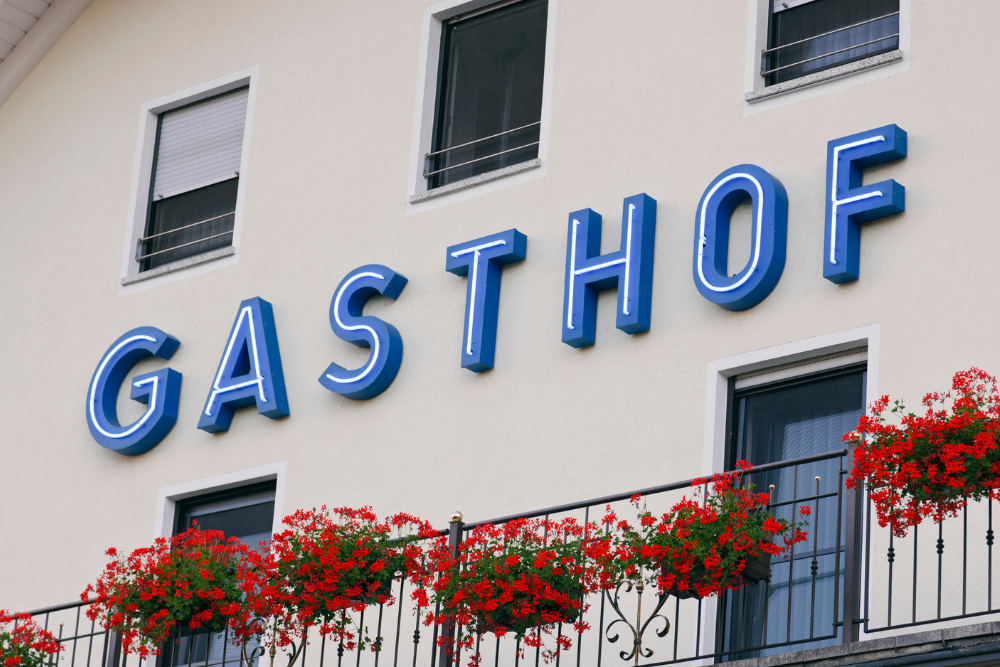
Signature Dish: Rösti with Zürcher Geschnetzeltes
Located in the canton of Solothurn, Gasthof Sternen is one of the oldest continuously operating restaurants in Switzerland. Established in 1230, this historic inn has welcomed travelers, merchants, and nobles for centuries.
The restaurant is famous for Rösti with Zürcher Geschnetzeltes, a classic Swiss dish featuring thinly sliced veal in a creamy white wine and mushroom sauce, served with crispy rösti (grated and pan-fried potatoes). This hearty dish is a staple of Swiss German cuisine and perfectly represents the region’s culinary traditions.
2. Walliser Keller (Founded in the 14th Century) – Zurich
Signature Dish: Cheese Fondue
Tucked away in Zurich’s old town, Walliser Keller is a historic restaurant specializing in Swiss Alpine cuisine. Dating back to the 14th century, this cozy eatery is dedicated to preserving traditional recipes from the canton of Valais.
Their signature dish is the Classic Swiss Cheese Fondue, made with a blend of Gruyère and Vacherin cheese, white wine, garlic, and kirsch (cherry brandy). Served with cubes of rustic bread, this dish is a communal experience, embodying the warm and convivial nature of Swiss dining.
3. Restaurant Kornhauskeller (Founded in 1711) – Bern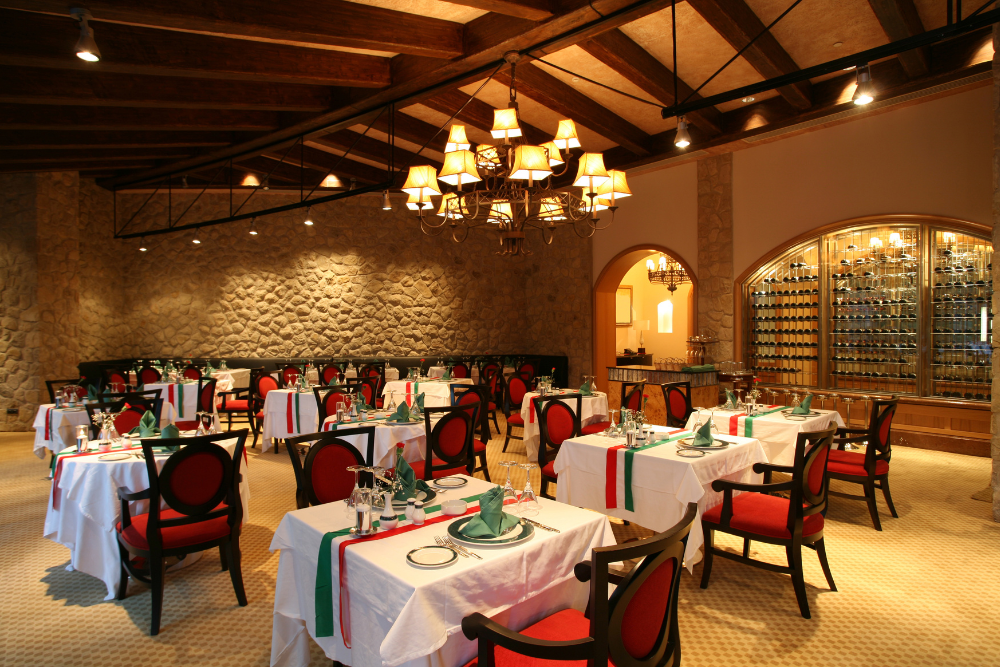
Signature Dish: Berner Platte
Housed in a former grain storage hall from the early 18th century, Kornhauskeller is one of Bern’s most historic dining establishments. The grand, vaulted dining room creates an impressive atmosphere, transporting guests back to the Baroque period.
The restaurant is best known for its Berner Platte, a generous platter of smoked meats, sausages, boiled beef, pork ribs, sauerkraut, and potatoes. This dish originated in Bern in 1798 when locals prepared a feast to celebrate their victory over French troops. Today, it remains a beloved specialty in the region.
4. Gasthof Löwen (Founded in 1356) – Canton of Aargau
Signature Dish: Zanderfilet (Pike-Perch Fillet) in White Wine Sauce
Situated in the village of Saanen, Gasthof Löwen has been serving guests since 1356. This historic inn is a charming blend of rustic Swiss architecture and warm hospitality.
One of its standout dishes is Zanderfilet in White Wine Sauce, a delicate fillet of pike-perch sourced from Swiss lakes, gently cooked and served with a light, buttery white wine sauce. The dish highlights the country’s freshwater fish traditions, making it a must-try for seafood lovers.
5. Zunfthaus zur Waag (Founded in 1315) – Zurich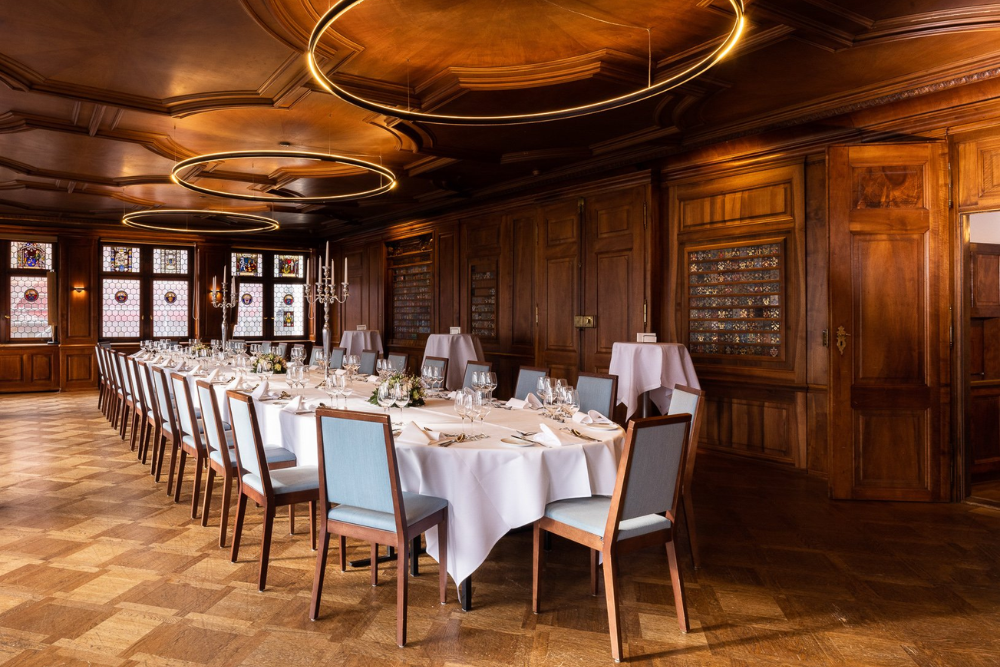
Signature Dish: Zürcher Eintopf (Zurich Stew)
Located in a historic guild house in Zurich’s old town, Zunfthaus zur Waag has been serving fine Swiss cuisine since the early 14th century. The restaurant retains its medieval charm, with wooden interiors and antique furnishings.
Its most famous dish is Zürcher Eintopf, a hearty Zurich-style stew made with beef, potatoes, carrots, onions, and a touch of white wine. Slow-cooked to perfection, this dish is a comforting reminder of Switzerland’s culinary heritage.
6. Gasthof Bären (Founded in 1371) – Gsteig bei Gstaad
Signature Dish: Älplermagronen (Swiss Alpine Macaroni)
Nestled in the Bernese Oberland, Gasthof Bären is a historic mountain inn that has been welcoming travelers since 1371. This charming guesthouse is known for its traditional Swiss comfort food.
Their specialty is Älplermagronen, a Swiss Alpine macaroni dish made with pasta, potatoes, cream, cheese, and onions, often served with a side of stewed apples. Originally a dish prepared by Alpine herders, it remains a favorite among locals and visitors alike.
7. Restaurant Old Swiss House (Founded in 1858) – Lucerne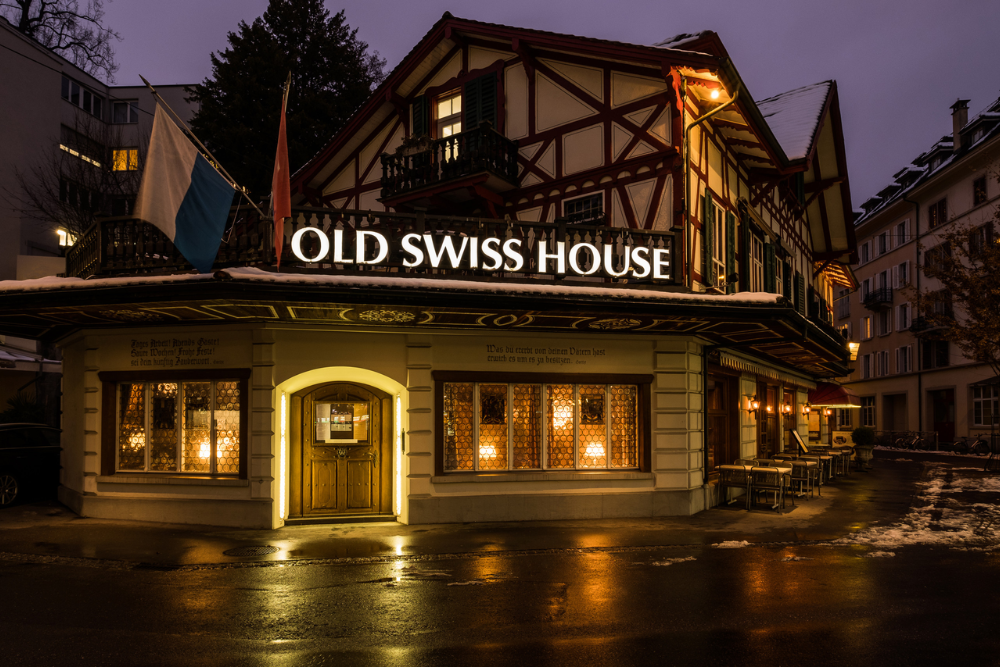
Signature Dish: Wiener Schnitzel Prepared Tableside
Located in the heart of Lucerne, Old Swiss House has been a culinary institution since 1858. The restaurant is known for its elegant wooden chalet-style architecture and warm, traditional ambiance.
Their standout dish is the Wiener Schnitzel, which is prepared tableside in an elaborate display. The veal cutlet is coated in breadcrumbs, fried in rich butter, and served with buttery noodles or potato salad. The restaurant’s unique preparation method has made this dish a legendary experience for visitors.
8. Chesa Veglia (Founded in 1650) – St. Moritz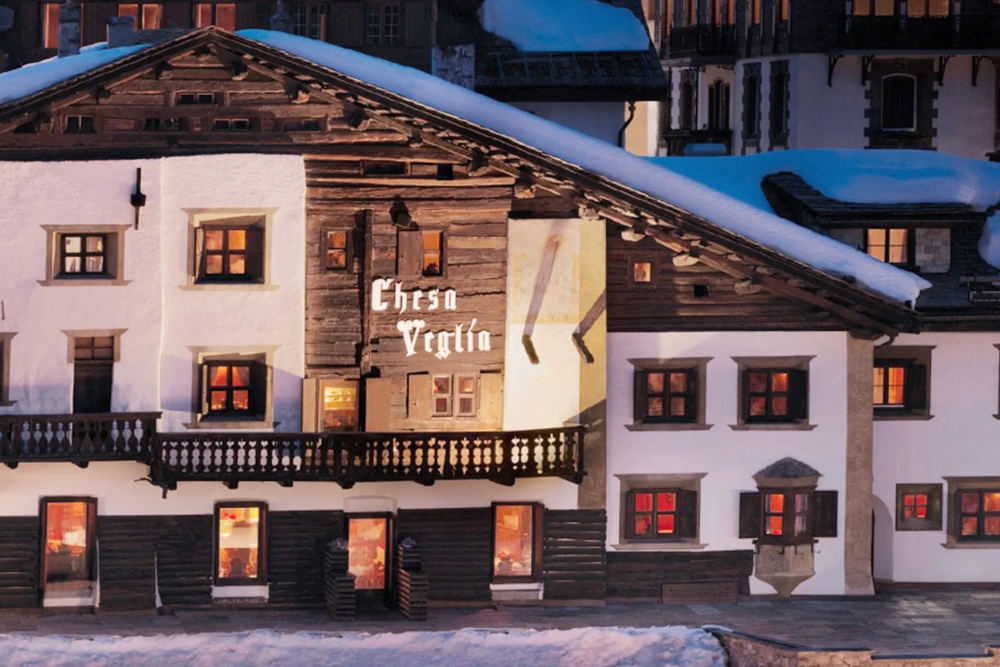
Signature Dish: Pizzoccheri della Valtellina
One of the most famous historic restaurants in the Engadin region, Chesa Veglia was originally a farmhouse built in 1650 before being converted into a gourmet dining destination. Located in the luxury resort town of St. Moritz, it offers a blend of rustic charm and fine dining.
The restaurant is known for Pizzoccheri della Valtellina, a hearty dish made with buckwheat pasta, potatoes, cabbage, and melted cheese, topped with browned butter and garlic. This dish originates from the nearby Italian-speaking region of Switzerland and reflects the area’s cross-border culinary influences.
Conclusion
Switzerland’s oldest restaurants are more than just places to eat—they are living monuments to the country’s rich culinary heritage. Each of these historic establishments has stood the test of time, preserving traditional recipes while continuing to offer exceptional hospitality.
Whether indulging in a classic cheese fondue in Zurich, savoring a plate of Berner Platte in Bern, or enjoying an Alpine macaroni dish in Gstaad, dining in these legendary restaurants is an experience that connects visitors to centuries of Swiss tradition.












